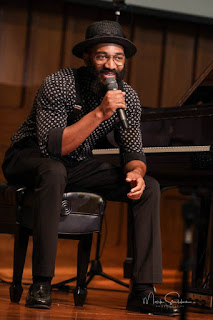Kenny Banks Jr. launches Premiere Series of American Pianists Awards
 |
| Kenny Banks Jr. works the room from the bench. |
Kenny Banks Jr. was the first of five finalists who will be heard in monthly outings through February at the Jazz Kitchen, accompanied by bassist Nick Tucker and drummer Kenny Phelps.
Constantly relating to the capacity crowd and getting positive feedback from it, the 30-year-old Atlanta resident displayed his command of the full piano keyboard, focusing on a penchant for instrumental color.
He also showed an affinity for medleys and original pieces that took the shape of tone poems for piano trio. He brought his assisting musicians — local stars in their own right — with him so faithfully throughout Saturday's second set that one might think they'd been working together a few months, not just a few days. (Like his peers in this series, Banks was linked to a local high school for three days before the Premiere Series event, so his comfort with the community and fellow musicians had some time to take hold.)
Still, the rapport with his trio mates was uncanny. The trio delivered a vivid weather report in "Sunshine After the Rain," a happy concoction of thunder, showers, drizzle, and clearing skies. Coordination seemed as intact as it had been just before in a more serious piece, "Cry for Diversity."
That was a complex, probing work with sudden tempo shifts and expressive turnarounds.
Even the tried and true was turned into something not tired, but still true, when Banks led the trio into "Tea for Two," an evergreen nearly a century old. The familiar melody was both teased out of shape and straightened out. The performance featured an estimable bass solo. Opportunities for Phelps to display his artistry were never lacking, surely making his many Indianapolis fans grateful.
Considering its assertive title, "This Is America" seemed as diffuse as its subject. Maybe that's just the way Banks thinks it should be. But despite quotes from "The Battle Hymn of the Republic" and, in a hushed coda, "America the Beautiful," the work didn't speak in a focused way, despite the cohesiveness of the performance.
More unified was the set-ender, a sensitive mash-up of Malotte's "Lord's Prayer" and Ellington's "In a Sentimental Mood." The gentle noodling pattern in the treble that the composer brought to the latter in a famous recording with John Coltrane made several appearances. This helped give a more reflective cast to the Malotte favorite, which is always in danger of giving its performers a sugar buzz.
Clearly adept at balancing his material, Banks made the tunes' partnership work well in an original blend. And this kind of thing certainly comes off best when you have partners of the caliber of Tucker and Phelps fully on board, as they unfailingly were.
[Photo by Mark Sheldon]
[Photo by Mark Sheldon]



Comments
Post a Comment